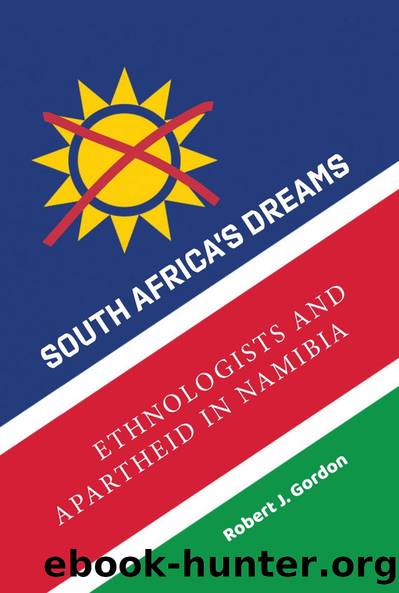South Africa's Dreams by Robert J. Gordon

Author:Robert J. Gordon [Gordon, Robert J.]
Language: eng
Format: epub
ISBN: 9781789209754
Barnesnoble:
Publisher: Berghahn Books, Incorporated
Published: 2021-02-05T00:00:00+00:00
Selling Apartheid to the World
At the June 1960 Addis Ababa meeting of the Conference of Independent African States, Ethiopia and Liberia, both former members of the League of Nations, signaled their intention of instituting legal proceedings against South Africa for not fulfilling the mandate. They formally initiated such charges in November of that year. They demanded that the mandate awarded to South Africa by the league to administer South-West Africa be revoked on the grounds that South Africa had acted in bad faith by neglecting to fulfill Article 22 of the mandate, namely âto promote to the utmost the material and moral well-being and the social progress of the inhabitants of the territory.â South Africaâs rejoinder was that the ultimate end it was pursuing in the territory, apartheid, was in accordance with enlightened and liberal opinion. The South African state had anticipated this challenge, and already in February of the same year van Warmelo had written a long memorandum entitled âSWA from an Ethnological Point of Viewâ for the Department of External Affairs. By April 1961 a special room had been set aside for all the relevant collected material, with âthree men busy indexing it.â Experts in native administration from the universities of Stellenbosch, Pretoria, and South Africa were called in as consultants. Writing to Jos Allen, the SWAâs additional native commissioner, van Warmelo, was not optimistic: âMost of what falls in my orbit, will be brushed aside as irrelevant. Itâs like Eichmannâs trial. You could not find impartial judges on the whole globe, the issue being already pre-judged.â22 Little did he realize that it was not only international opinion that was to find his research irrelevant but also the South African legal team.
An undated memo entitled âRe: Applicants Instituting Proceedingsâ is a multi-authored essay in which Eiselen, the secretary for native affairs, played a leading part. While van Warmelo was to describe the physical, cultural, and linguistic diversity and the great differences between them that allegedly existed before colonialism and that the administration had simply recognized, Eiselenâs task was to make the general case for separate development, alleging that there was no such thing as a SWA nation, only a number of widely different nations and races who lived apart and preferred to live that way. He cited missionary sources from the thirties, including Joseph Oldham, secretary of the International Africa Institute, and Siegfried Knak, a major figure in German missionary circles. Eiselen then sought to justify the importance of race in the territory, thereby critiquing the famous 1950 UNESCO statement on race, by citing statements by the cross-cultural psychologist S. D. Porteus, published in the 1960 inaugural volume of Mankind Quarterly, a right-wing journal promoting the idea of âscientificâ racism. Eiselen tempered his views, though, by claiming that black races were not permanently inferior but might be equal or even superior to Europeans in certain ways. Racial differences were inescapable; thus, while SWA was a multiracial country, it was not a multiracial community.23
The ICJâs highly contested verdict in
Download
This site does not store any files on its server. We only index and link to content provided by other sites. Please contact the content providers to delete copyright contents if any and email us, we'll remove relevant links or contents immediately.
| Central Africa | East Africa |
| North Africa | Southern Africa |
| West Africa | Algeria |
| Egypt | Ethiopia |
| Kenya | Nigeria |
| South Africa | Sudan |
| Zimbabwe |
Goodbye Paradise(2974)
Men at Arms by Terry Pratchett(2408)
Tobruk by Peter Fitzsimons(2065)
Pirate Alley by Terry McKnight(1911)
Arabs by Eugene Rogan(1841)
Borders by unknow(1791)
Belonging by Unknown(1473)
The Biafra Story by Frederick Forsyth(1327)
It's Our Turn to Eat by Michela Wrong(1305)
Botswana--Culture Smart! by Michael Main(1239)
A Winter in Arabia by Freya Stark(1226)
Gandhi by Ramachandra Guha(1198)
Coffee: From Bean to Barista by Robert W. Thurston(1184)
Livingstone by Tim Jeal(1154)
The Falls by Unknown(1143)
The Source by James A. Michener(1137)
The Shield and The Sword by Ernle Bradford(1102)
Egyptian Mythology A Fascinating Guide to Understanding the Gods, Goddesses, Monsters, and Mortals (Greek Mythology - Norse Mythology - Egyptian Mythology) by Matt Clayton(1089)
Africa: Altered States, Ordinary Miracles by Richard Dowden(1080)
